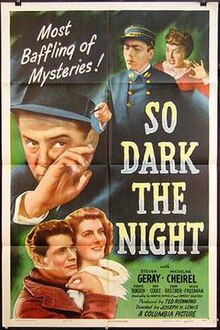So Dark the Night
| So Dark the Night | |
|---|---|

Theatrical release poster
|
|
| Directed by | Joseph H. Lewis |
| Produced by | Ted Richmond |
| Screenplay by | Dwight V. Babcock Martin Berkeley |
| Story by | Aubrey Wisberg |
| Starring |
Steven Geray Micheline Cheirel |
| Music by | Hugo Friedhofer |
| Cinematography | Burnett Guffey |
| Edited by | Jerome Thoms |
| Distributed by | Columbia Pictures |
|
Release date
|
|
|
Running time
|
71 minutes |
| Country | United States |
| Language | English |
So Dark the Night is a 1946 American crime film in the film noir tradition, directed by Joseph H. Lewis and written by Dwight V. Babcock, Martin Berkeley. It is based on a story written by Aubrey Wisberg. The drama features Steven Geray, Micheline Cheirel, Eugene Borden, among others.
So Dark the Night is the story of a detective, Henri Cassin (Steven Geray) from Paris, who falls in love with an innkeeper's daughter Nanette (Micheline Cheirel) while on a long overdue vacation. She is a country girl with a jealous boyfriend. Nonetheless, the detective becomes engaged to her. Then the girl vanishes the night of her engagement party and later shows up dead. Cassin believes that the obvious suspect is Leon (Paul Marion), the old boyfriend, but soon he is also found killed. Soon after Mama (Ann Codee) receives a warning that she will be the next to die, she is found strangled.
Pierre, fearing for his safety, decides to sell the inn, Henri returns to Paris and comes up with a sketch of the killer based on information provided by the footprint. To Henri's astonishment, the sketch bears the exact likeness of himself, and when he fits his shoe into the footprint, he realizes that he is undoubtedly the killer. After making a full confession to the police commissioner, Henri is evaluated by a psychiatrist, who determines that he is schizophrenic. Though placed under watch of a guard, Henri escapes back to St. Margot, where he tries to strangle Pierre. However, the police commissioner, who has followed Henri to the village, catches the detective in the act and shoots him.
Critic Karl Williams called the film, "[A] well-plotted and executed film noir suffered from its lack of star power, but has become something of a cult classic."
The staff at Variety magazine gave the film a positive review, writing, "Around the frail structure of a story [by Aubrey Wisberg] about a schizophrenic Paris police inspector who becomes an insane killer at night, a tight combination of direction, camerawork and musical scoring produce a series of isolated visual effects that are subtle and moving to an unusual degree."
Critic Dennis Schwartz lauded the film and wrote, "This is Joseph H. Lewis's second feature and one that has the same intense energy as his The Big Combo (1955) and My Name is Julia Ross (1945). The Freudian story is wacky and strains credibility, but the elegant style Lewis uses is mesmerizing. The film noir's light touches are magnificently caught in the rich depiction of rural life and the character study of a psychological breakdown due to a pressured psyche that induces schizophrenia. This makes for a fascinating watch. So Dark the Night is a rarely shown obscure film, and it is a beauty. Burnett Guffey used his camera effectively in many strange angled shots while his dark black shadings express the contrasting somber mood to the airy country landscape."
...
Wikipedia
